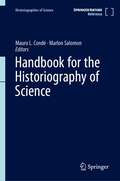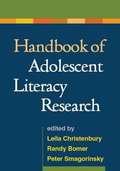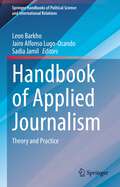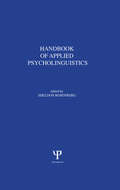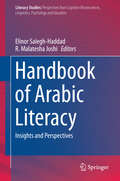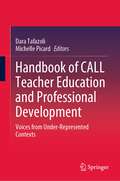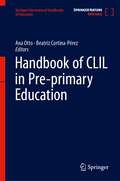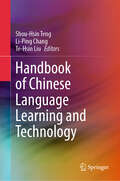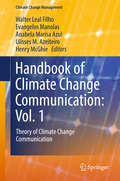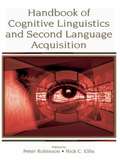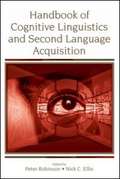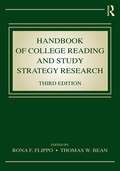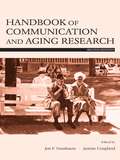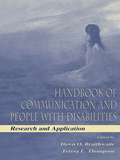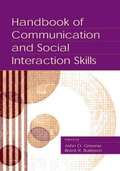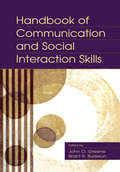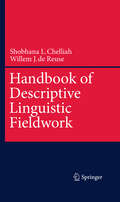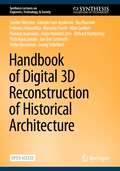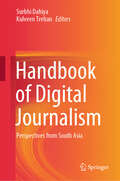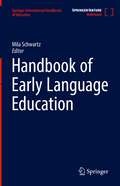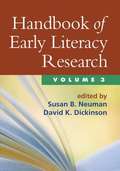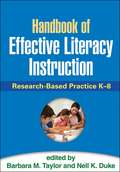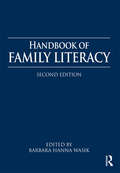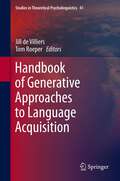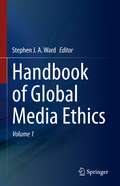- Table View
- List View
Handbook for the Historiography of Science (Historiographies of Science)
by Mauro L. Condé Marlon SalomonThis book aims to perform a critical and broad assessment of the historiography of science produced from the late nineteenth century to the early twenty-first century. It presents its main authors, concepts, ideas, conceptions, and schools. It also analyzes the historical circumstances of the rise of the discipline history of science and the relations of the historiography of science with related areas. These chapters do not understand the historiography of science as a mere description or record of the history of science. Instead, they understand the historiography of science from the epistemological criteria and choices that guided the writing of the history of science in its different contexts. In other words, more than describing the record of the various possibilities of historiographical approaches to science, the chapters carry out an epistemological reflection to assess the bases, possibilities, scope, and limits of different historiographical conceptions, authors, and traditions that have established the writing of the history of science. This book can be conceived as a reference work not only for professional historians and philosophers but also for academics from different backgrounds who are initiating themselves in the universe of history and philosophy of science, be they scientists from different fields or young researchers from different backgrounds who want to start studying the history and philosophy of science.
Handbook of Adolescent Literacy Research
by Leila Christenbury Randy BomerThe first comprehensive research handbook of its kind, this volume showcases innovative approaches to understanding adolescent literacy learning in a variety of settings. Distinguished contributors examine how well adolescents are served by current instructional practices and highlight ways to translate research findings more effectively into sound teaching and policymaking. The book explores social and cultural factors in adolescents' approach to communication and response to instruction, and sections address literacy both in and out of schools, including literacy expectations in the contemporary workplace. Detailed attention is given to issues of diversity and individual differences among learners.
Handbook of Applied Journalism: Theory and Practice (Springer Handbooks of Political Science and International Relations)
by Leon Barkho Sadia Jamil Jairo Alfonso Lugo-OcandoThis authoritative handbook looks at the entire news cycle and provides a bridge between the theoretical and academic study of journalism and its actual contemporary practice. The book's main merit is that it brings theory and practice together, with contributors discussing these issues from different perspectives in a way that scholars, students, and practitioners can find useful in the study of journalism. The handbook is also unique as it undertakes an international scope across regions and cultures, both from the West and the Global South, while providing an overview which balances the (over-) emphasis on content in most academic approaches to journalism.The book is divided into four major parts: (1) Conceptual foundations, (2) Interlink between journalism as scholarship and journalism as practice, (3) Regions and cultures, and (4) The practitioner world. The first two sections lay down the foundation for section (3) which provides an overview of journalism practice in different regions and cultures. Section (4) includes contributions by practitioners in which they attempt to respond to some of the issues raised in preceding sections.This handbook will appeal to academics, practitioners, and professionals alike, who are interested in a better understanding of the academic study of journalism and its actual contemporary practice.
Handbook of Applied Psycholinguistics: Major Thrusts of Research and Theory
by Sheldon RosenbergFirst published in 1982. The chapters of this handbook contain critical integrative reviews of research and theory in the major areas of the field of applied psycholinguistics, the field in which applied problems of language and communicative functioning and development are approached from the standpoint of basic research and theory in psycholinguistics and related areas of cognitive psychology. The book was designed to meet the needs of researchers, practitioners and graduate students from such disciplines as education (including special education), language learning, linguistics, neurology, psychiatry, psychology, and speech and hearing for such reviews, although the state of research in an area and a desire to stress research and theory in substantive areas resulted in a decision not to include chapters on the measurement of linguistic maturity, language intervention, the language of the learning disabled child, language and environmental deprivation, language and mania, language and senile dementia, and the design of written and oral information and computer command language.
Handbook of Arabic Literacy
by R. Malatesha Joshi Elinor Saiegh-HaddadThis book provides a synopsis of recently published empirical research into the acquisition of reading and writing in Arabic. Its particular focus is on the interplay between the linguistic and orthographic structure of Arabic and the development of reading and writing/spelling. In addition, the book addresses the socio-cultural, political and educational milieu in which Arabic literacy is embedded. It enables readers to appreciate both the implications of empirical research to literacy enhancement and the challenges and limitations to the applicability of such insights in the Arabic language and literacy context. The book will advance the understanding of the full context of literacy acquisition in Arabic with the very many factors (religious, historical, linguistic etc. ) that interact and will hence contribute to weakening the anglocentricity that dominates discussions of this topic.
Handbook of CALL Teacher Education and Professional Development: Voices from Under-Represented Contexts
by Michelle Picard Dara TafazoliThis comprehensive handbook provides an overview of current trends in computer-assisted language learning (CALL) teacher education and professional development across the globe. It highlights theories and practices in CALL teacher education and professional development in five sections, such as English language teaching, including pre-service teachers, in-service teachers, teacher educators, material developers, course designers and researchers. It explores the role of CALL teacher education and professional development in many underexplored countries such as Africa, Asia, Eastern Europe and the Middle East. It stresses the critical role of professional development programs, from the use of technology in its generic sense. The theoretical and empirical chapters in the book provide a more inclusive and comprehensive picture of various aspects of CALL teacher education and professional development globally. It offers context-specific approaches and strategies to language teachers and teacher educators. It provides pedagogical implications and suggestions for promoting digital literacy and autonomy in online education. This book provides valuable insights for researchers, teacher educators and teacher trainers in applied linguistics.
Handbook of CLIL in Pre-primary Education (Springer International Handbooks of Education)
by Ana Otto Beatriz Cortina-PérezThis book provides an in-depth look on Content and Language Integrated Learning (CLIL) and Early Childhood Education (ECE), two domains where major joint research is needed. By taking stock on theoretical underpinnings, it explores the ideal conditions for early additional language acquisition in preschool contexts through CLIL with a learner-centered approach grounded in developmentally appropriate practices (DEP) and an emphasis on the importance of play, cognition, holistic content adaptation and social-emotional learning. The book also offers a comprehensive view of how this methodological approach has already set a clear path on Pre-primary education internationally. Finally, it offers insights into CLIL pedagogies as related and adapted to Pre-primary education, resources and materials for very young learners and practical implementation from the classroom. By providing a solid empirical background on Pre-primary CLIL, along with appropriate methodological issues and practices, this book serves as a key resource to students, practitioners, academics as well as teacher educators and policy-makers in international contexts.
Handbook of Chinese Language Learning and Technology
by Shou-Hsin Teng Li-Ping Chang Te-Hsin LiuThis handbook explores quantitative linguistics, pedagogy, and Mandarin language acquisition in an integrated fashion and helps readers grasp how insights from quantitative linguistics can shed light on Mandarin language acquisition. It focuses on issues related to language processing, learning, and teaching and how these aspects are affected or enhanced by corpus-based and computational linguistics. By following a data-driven approach, the handbook demonstrates how theoretical problems in the acquisition of Chinese can be resolved with empirical evidence. The book serves as an essential resource for students and researchers wishing to explore the fascinating field of Chinese language processing and acquisition.
Handbook of Climate Change Communication: Vol. 1
by Walter Leal Filho Ulisses M. Azeiteiro Anabela Marisa Azul Evangelos Manolas Henry McGhieThis comprehensive handbook provides a unique overview of the theory, methodologies and best practices in climate change communication from around the world. It fosters the exchange of information, ideas and experience gained in the execution of successful projects and initiatives, and discusses novel methodological approaches aimed at promoting a better understanding of climate change adaptation. Addressing a gap in the literature on climate change communication and pursuing an integrated approach, the handbook documents and disseminates the wealth of experience currently available in this field. Volume 1 of the handbook provides a unique description of the theoretical basis and of some of the key facts and phenomena which help in achieving a better understanding of the basis of climate change communication, providing an essential basis for successful initiatives in this complex field.
Handbook of Cognitive Linguistics and Second Language Acquisition
by Peter Robinson Nick C. EllisThis cutting-edge volume describes the implications of Cognitive Linguistics for the study of second language acquisition (SLA). The first two sections identify theoretical and empirical strands of Cognitive Linguistics, presenting them as a coherent whole. The third section discusses the relevance of Cognitive Linguistics to SLA and defines a research agenda linking these fields with implications for language instruction. Its comprehensive range and tutorial-style chapters make this handbook a valuable resource for students and researchers alike.
Handbook of Cognitive Linguistics and Second Language Acquisition
by Peter Robinson Nick EllisThis cutting-edge volume describes the implications of Cognitive Linguistics for the study of second language acquisition (SLA). The first two sections identify theoretical and empirical strands of Cognitive Linguistics, presenting them as a coherent whole. The third section discusses the relevance of Cognitive Linguistics to SLA and defines a research agenda linking these fields with implications for language instruction. Its comprehensive range and tutorial-style chapters make this handbook a valuable resource for students and researchers alike.
Handbook of College Reading and Study Strategy Research
by Rona F. Flippo Thomas W. BeanThe most comprehensive and up-to-date source available for college reading and study strategy practitioners and administrators, the Third Edition of the Handbook of College Reading and Study Strategy Research reflects and responds to changing demographics as well as politics and policy concerns in the field since the publication of the previous edition. In this thorough and systematic examination of theory, research, and practice, the Handbook offers information to help college reading teachers to make better instructional decisions; justification for programmatic implementations for administrators; and a complete compendium of both theory and practice to better prepare graduate students to understand the parameters and issues of this field. The Handbook is an essential resource for professionals, researchers, and students as they continue to study, research, learn, and share more about college reading and study strategies. Addressing current and emerging theories of knowledge, subjects, and trends impacting the field, the Third Edition features new topics such as disciplinary literacy, social media, and gaming theory.
Handbook of Communication and Aging Research
by Jon F. Nussbaum Justine CouplandThis second edition of the Handbook of Communication and Aging Research captures the ever-changing and expanding domain of aging research. Since it was first recognized that there is more to social aging than demography, gerontology has needed a communication perspective. Like the first edition, this handbook sets out to demonstrate that aging is not only an individual process but an interactive one. The study of communication can lead to an understanding of what it means to grow old. We may age physiologically and chronologically, but our social aging--how we behave as social actors toward others, and even how we align ourselves with or come to understand the signs of difference or change as we age--are phenomena achieved primarily through communication experiences.Synthesizing the vast amount of research that has been published on communication and aging in numerous international outlets over the last three decades, the book's contributors include scholars from North America and the United Kingdom who are active researchers in the perspectives covered in their particular chapter. Many of the chapters work to deny earlier images of aging as involving normative decrement to provide a picture of aging as a process of development involving positive choices and providing new opportunities. A recuring theme in many chapters is that of the heterogeneity of the group of people who are variously categorized as older, aged, elderly, or over 65. The contributors review the literature analytically, in a way that reveals not only current theoretical and methodological approaches to communication and aging research but also sets the future agenda.This handbook will be of great interest to scholars and researchers in gerontology, developmental psychology, and communication, and, in this updated edition, will continue to play a key role in the study of communication and aging.
Handbook of Communication and People With Disabilities: Research and Application (Routledge Communication Series)
by Dawn O. Braithwaite Teresa L. ThompsonThis Handbook represents the first comprehensive collection of research on communication and people with disabilities. The editors have brought together original contributions focusing on the identity, social, and relationship adjustments faced by people with disabilities and those with whom they relate. Essays report on topics across the communication spectrum--interpersonal and relationship issues, people with disabilities in organizational settings, disability and culture, media and technologies, communication issues as they impact specific types of disabilities--and establish a future agenda for communication and disability research. Each chapter provides a state-of-the-art literature review, practical applications of the material, and keywords and discussion questions to facilitate classroom use. In providing an outlet for current research on communication and disability issues, this unique collection contributes to the lives of people with and without disabilities, helping them to improve their own communication and relationships. Intended for readers in communication, psychology, sociology, rehabilitation, social work, special education, gerontology, and related disciplines, this handbook is certain to augment further theory and research, as well as offer insights for both personal and professional relationships.
Handbook of Communication and Social Interaction Skills
by John O. Greene Brant Raney BurlesonProviding a survey of the theory and research on social interaction skills, this volume contains 24 papers on theoretical and methodological concerns in research, fundamental interaction skills, function-focused skills, the management of diverse personal relationships, and the sills required by public and professional life. Specific chapters discuss models of skill acquisition, methods of assessment, persuasion, friendship, marriage, management, leadership, and teaching. Empirically supported strategies for developing and enhancing these skills are emphasized. Annotation (c)2003 Book News, Inc., Portland, OR (booknews.com)
Handbook of Communication and Social Interaction Skills (Routledge Communication Series)
by JOHN O. GREENE; BRANT R. BURLESONProviding a thorough review and synthesis of work on communication skills and skill enhancement, this Handbook serves as a comprehensive and contemporary survey of theory and research on social interaction skills. Editors John O. Greene and Brant R. Burleson have brought together preeminent researchers and writers to contribute to this volume, establishing a foundation on which future study and research will build. The handbook chapters are organized into five major units: general theoretical and methodological issues (models of skill acquisition, methods of skill assessment); fundamental interaction skills (both transfunctional and transcontextual); function-focused skills (informing, persuading, supporting); skills used in management of diverse personal relationships (friendships, romances, marriages); and skills used in varied venues of public and professional life (managing leading, teaching). Distinctive features of this handbook include:* broad, comprehensive treatment of work on social interaction skills and skill acquisition;* up-to-date reviews of research in each area; and* emphasis on empirically supported strategies for developing and enhancing specific skills.Researchers in communication studies, psychology, family studies, business management, and related areas will find this volume a comprehensive, authoritative source on communications skills and their enhancement, and it will be essential reading for scholars and students across the spectrum of disciplines studying social interaction.
Handbook of Descriptive Linguistic Fieldwork
by Shobhana L. Chelliah Willem J. ReuseThe Handbook of Descriptive Linguistic Fieldwork is the most comprehensive reference on linguistic fieldwork on the market bringing together all the reader needs to carry out successful linguistic fieldwork. Based on the experiences of two veteran linguistic fieldworkers and advice from more than a twenty active fieldwork researchers, this handbook provides an encyclopedic review of current publications on linguistic fieldwork and surveys past and present approaches and solutions to problems in the field, and the historical, political, and social variables correlating with fieldwork in different areas of the world. The discussion of the ethical dimensions of fieldwork, as well as what constitutes the "typical" linguistic fieldwork setting or consultant is explored from multiple perspectives relevant to fieldwork on every continent. Included is information omitted in most other texts on the subject such as the collection, representation, management, and methods of extracting grammatical information from discourse and conversational data as well as the relationship between questionnaire-based elicitation, text-based elicitation, and philology, and the need for combinations of these methods. The book is useful before, during and after linguistic field trips since it provides extensive practical macro and micro organization and planning fieldwork tips as well as a handy sketch of major typological features for use in linguistic analysis. Comprehensive references are provided at the end of each chapter as resources relevant to the reader's particular interests.
Handbook of Digital 3D Reconstruction of Historical Architecture (Synthesis Lectures on Engineers, Technology, & Society #28)
by Sander Münster Piotr Kuroczyński Marinos Ioannides Heike Messemer Fabrizio Ivan Apollonio Ina Bluemel Federico Fallavollita Riccardo Foschi Marc Grellert Peter Heinrich Jahn Richard Kurdiovsky Jan-Eric Lutteroth Georg SchelbertThis open access book is a handbook for students, experts and interested parties who want to learn more about digital 3D reconstruction of historical architecture. The book provides answers to the core questions of the subject: What is a digital 3D model or a digital 3D reconstruction? How are they created and what are they used for? Practical instructions, condensed knowledge, explanations of technical terms and references to example projects, literature and further references provide information of varying density and thus enable an individual introduction to the subject.The book combines extensive knowledge on the topic of "digital 3D reconstruction of historical architecture" and provides practical instructions for independent implementation. Up to now, there has been no cross-disciplinary vocabulary for technical terms in this field, so this publication makes a start.The book is aimed at students, experts in the field and the interested public and offers various possibilities for the different target groups to delve deeply into the subject.The book was created within the research network "Digital 3D Reconstruction as Tools for Research in Architectural History," which was funded by the German Research Foundation (DFG) from 2018 to 2023. The authors combined their expertise in the fields of art and architectural history, architecture, university teaching and media informatics.
Handbook of Digital Journalism: Perspectives from South Asia
by Surbhi Dahiya Kulveen TrehanThis book presents perspectives from South Asian countries, such as India, Nepal, Sri Lanka, Bangladesh, and Bhutan. It brings in-depth perspectives on content, communication, and community between communication theory and the digital news ecosystem rooted in a South Asian culture-centric approach. The book thoroughly investigates changes in the regulatory framework, regulations, policies, and code of conduct. It engages debates on digital journalism practices modeled around mobile journalism, immersive storytelling, and gamification in the context of local and hyper-local communities in South Asia. The book provides a cohesive compilation offering readers an up-to-date and comprehensive understanding of digital developments in journalism. It also helps journalists and practitioners working in news media to discover new types of information flows in a rapidly changing news media landscape.Digital Journalism: Perspectives from South Asia is a descriptive, exploratory book on digital journalism practices and policies followed in India, Nepal, Sri Lanka, Bangladesh, and Bhutan. It brings in-depth perspectives on content, communication, and community between communication theory and the digital news ecosystem rooted in a South Asia. What makes this book interesting to read is the integration of forms with manifestations on ground intersecting identities and ideologies. The book thoroughly investigates changes in the regulatory framework, regulations, policies, and code of conduct. Various chapters in the book pursue significant and exciting topics on the changing spaces of news production and consumption, the inter relationship between old and new media, everyday digital news usage and engagement, social media for news, revenue models for digital journalism among others. The highlight of this book is engaging debates on digital journalism practices modeled around mobile journalism, immersive storytelling, gamification, in the context of local and hyper local communities in South Asia. Since Digital Journalism draws extensively from algorithms, matrices and analytics, this book has exclusive chapters on data journalism, data visualization and big data.. The book provides a cohesive compilation offering readers an up-to-date and comprehensive understanding of digital developments in journalism. It also helps journalists and practitioners working in news media to discover new types of information flows in a rapidly changing news media landscape. It also articulates indegenous concerns of journalists, their security, risks and challenges as they explore the new contours of journalistic practices.
Handbook of Early Language Education (Springer International Handbooks of Education)
by Mila SchwartzThis is the first international and interdisciplinary handbook to offer a comprehensive and an in-depth overview of findings from contemporary research, theory, and practice in early childhood language education in various parts of the world and with different populations. The contributions by leading scholars and practitioners are structured to give a survey of the topic, highlight its importance, and provide a critical stance. The book covers preschool ages, and looks at children belonging to diverse ethno-linguistic groups and experiencing different histories and pathways of their socio-linguistic and socio-cultural development and early education. The languages under the scope of this handbook are identified by the contributors as immigrant languages, indigenous, endangered, heritage, regional, minority, majority, and marginalized, as well as foreign and second languages, all of which are discussed in relation to early language education as the key concept of the handbook. In this volume, “early language education” will refer to any kind of setting, both formal and informal (e.g. nursery, kindergarten, early childhood education centers, complementary early schooling etc.) in which language learning within a context of children's sociolinguistic diversity takes place before elementary school.
Handbook of Early Literacy Research, Volume 3
by David Dickinson Susan NeumanBuilding crucial bridges between theory, research, and practice, this volume brings together leading authorities on the literacy development of young children. The Handbook examines the full range of factors that shape learning in and out of the classroom, from basic developmental processes to family and sociocultural contexts, pedagogical strategies, curricula, and policy issues. Highlights of Volume 3 include cutting-edge perspectives on English language learning; innovative ways to support print knowledge, phonological awareness, and other code-related skills; and exemplary approaches to early intervention and teacher professional development.
Handbook of Effective Literacy Instruction
by Barbara M. Taylor Nell K. DukeThis highly readable handbook synthesizes the best research on K-8 literacy instruction and distills key implications for classroom practice. Noted contributors provide clear recommendations for creating effective, motivating classroom environments; teaching core components of literacy; integrating literacy with content-area instruction; and building a schoolwide literacy program that helps all students succeed. Helpful figures, tables, resource lists, reflection questions, and concrete examples from real classrooms make the book an ideal tool for teacher training and professional development. Numerous reproducible worksheets and checklists can be downloaded and printed in a convenient 8 1/2" x 11" size.
Handbook of Family Literacy
by Barbara Hanna WasikThe Handbook of Family Literacy, 2e, provides the most comprehensive, up-to-date coverage of family literacy of any available book. It documents the need for literacy education for children and parents, describes early literacy and math development within the home, analyses interventions in home and center settings, and examines the issues faced by fathers and women with low literacy skills. Cultural issues are examined especially those for Hispanic, African American, American Indian, Alaskan Native, and migrant populations. Noted experts throughout the United States, Canada, England, the Netherlands, Germany, New Zealand, and South Africa analyze the commonalities and differences of family literacy across cultures and families. Key features include the following. Comprehensive – Provides updated information on the relation between early childhood literacy development, parenting education, and intervention services. Research Focus – Provides an extensive review of experimental studies, including national reviews and meta-analyses on family literacy. Practice Focus – Provides a comprehensive treatment of family literacy interventions necessary for program developers, policy makers, and researchers. Diversity Focus – Provides detailed information on cultural and diversity issues for guiding interventions, policy, and research. International Focus – Provides an international perspective on family literacy services that informs program developers, researchers, and policy makers across countries. Evaluation Focus – Provides detailed guidelines for ensuring program quality and fidelity and a valuable new evaluation perspective based on implementation science. This book is essential reading for anyone – researchers, program developers, students, practitioners, and policy makers – who needs to be knowledgeable about intervention issues, family needs, program developments, and research outcomes in family literacy.
Handbook of Generative Approaches to Language Acquisition
by Tom Roeper Jill De VilliersModern linguistic theory has been based on the promise of explaining how language acquisition can occur so rapidly with such subtlety, and with both surprising uniformity and diversity across languages. This handbook provides a summary and assessment of how far that promise has been fulfilled, exploring core concepts in acquisition theory, including notions of the initial state, parameters, triggering theory, the role of competition and frequency, and many others, across a variety of syntactic topics that have formed the central domains of investigation and debate. These topics are treated from the unique perspective of central actors in each domain who have helped shape the research agenda. The authors have presented a summary of the data, the theories under discussion, and their own best assessments of where each domain stands. Providing as well the agenda for future work in the field showing both particular needs and general directions that should be pursued in the coming decades.
Handbook of Global Media Ethics
by Stephen J. A. WardThis handbook is one of the first comprehensive research and teaching tools for the developing area of global media ethics. The advent of new media that is global in reach and impact has created the need for a journalism ethics that is global in principles and aims. For many scholars, teachers and journalists, the existing journalism ethics, e.g. existing codes of ethics, is too parochial and national. It fails to provide adequate normative guidance for a media that is digital, global and practiced by professional and citizen. A global media ethics is being constructed to define what responsible public journalism means for a new global media era. Currently, scholars write texts and codes for global media, teach global media ethics, analyse how global issues should be covered, and gather together at conferences, round tables and meetings. However, the field lacks an authoritative handbook that presents the views of leading thinkers on the most important issues for global media ethics. This handbook is a milestone in the field, and a major contribution to media ethics.
